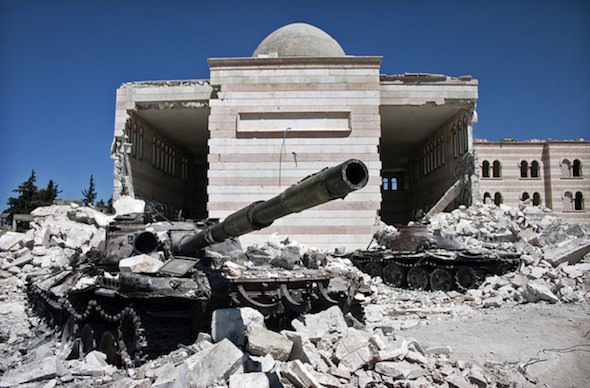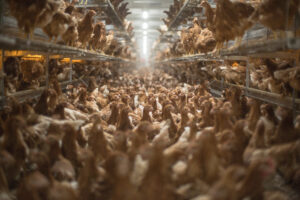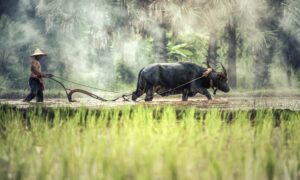Climate Change a Probable Factor in Syria’s Conflict
Researchers say climate change probably caused the drought that affected Syria nearly a decade ago -- and helped spark the country’s current civil war. By Alex Kirby, Climate News Network

Two wrecked tanks in front of a battered mosque in Azaz after a battle between Syrian rebel and government forces in 2012. (Christiaan Triebert via Flickr)
This Creative Commons-licensed piece first appeared at Climate News Network.
LONDON — In a dire chain of cause and effect, the drought that devastated parts of Syria from 2006 to 2010 was probably the result of climate change driven by human activities, a new study says.
And the study’s authors think that the drought may also have contributed to the outbreak of Syria’s uprising in 2011.
The drought, which was the worst ever recorded in the region, ravaged agriculture in the breadbasket region of northern Syria, driving dispossessed farmers to the cities where poverty, government mismanagement and other factors created the unrest that exploded four years ago. The conflict has left at least 200,000 people dead, and has displaced millions of others.
The study, by scientists from Lamont-Doherty Earth Observatory at Columbia University, US, is published in the Proceedings of the National Academy of Sciences.
The authors are quite clear that the climatic changes were human-driven (anthropogenic) and cannot be attributed simply to natural variability, but are careful to stress that their findings are tentative.
“We’re not saying the drought caused the war,” says Richard Seager, one of the co-authors. “We’re saying that, added to all the other stressors, it helped kick things over the threshold into open conflict.
“And a drought of that severity was made much more likely by the ongoing human-driven drying of that region.”
Link with violence
Their study, although it contains new material, is not the first to suggest a possible link between extreme weather and the likelihood of violence.
Some researchers have investigated whether there may be a link between El Niño and La Niña — the periodic Pacific weather disruptions — and outbreaks of unrest.
Syria was not the only country affected by the drought. It struck the Fertile Crescent, linking Turkey, Syria and Iraq, where agriculture and animal herding are believed to have started around 12,000 years ago.
Suggestions of a global connection between climate change and political instability is being taken seriously by two influential groups — insurers and military planners.
The Levant has always seen natural weather swings. Other research has suggested that the Akkadian empire, spanning much of the Fertile Crescent about 4,000 years ago, probably collapsed during a long drought.
“Drought can lead to devastating consequences when coupled with pre-existing acute vulnerability”
But the authors of the Lamont-Doherty study, using existing studies and their own research, showed that the area has warmed by between 1°C and 1.2°C since 1900, and has undergone a 10% reduction in wet-season precipitation.
They say this trend is a neat match for models of human-influenced global warming, and so cannot be attributed to natural variability.
Global warming has had two effects, they say. First, it appears to have indirectly weakened wind patterns that bring rain-laden air from the Mediterranean, reducing precipitation during the usual November-April wet season. And higher temperatures have increased the evaporation of moisture from soils during the hot summers.
The authors say an episode of this severity and length would have been unlikely without the long-term changes.
Other researchers have observed the long-term drying trend across the Mediterranean region, and have attributed at least part of it to anthropogenic warming.
The researchers say Syria was especially vulnerable because of other factors — including a huge increase in population from four million in the 1950s to 22 million in recent years.
Water-intensive crops
The government has also encouraged water-intensive export crops such as cotton, while illegal drilling of irrigation wells depleted groundwater, says co-author Shahrzad Mohtadi, an international affairs consultant at the US Department of State.
The drought’s effects were immediate and overwhelming. Agricultural production — typically, a quarter of Syria‘s gross domestic product — fell by a third. In the northeast, livestock was practically wiped out, cereal prices doubled, and nutrition-related diseases among children increased steeply.
As many as 1.5 million people fled from the countryside to cities already strained by waves of refugees from the war in neighbouring Iraq.
“Rapid demographic change encourages instability,” the authors say. “Whether it was a primary or substantial factor is impossible to know, but drought can lead to devastating consequences when coupled with pre-existing acute vulnerability.”
Solomon Hsiang, professor of public policy at the University of California, Berkeley, says the study is “the first scientific paper to make the case that human-caused climate change is already altering the risk of large-scale social unrest and violence.”
Independent journalism is under threat and overshadowed by heavily funded mainstream media.
You can help level the playing field. Become a member.
Your tax-deductible contribution keeps us digging beneath the headlines to give you thought-provoking, investigative reporting and analysis that unearths what's really happening- without compromise.
Give today to support our courageous, independent journalists.






You need to be a supporter to comment.
There are currently no responses to this article.
Be the first to respond.